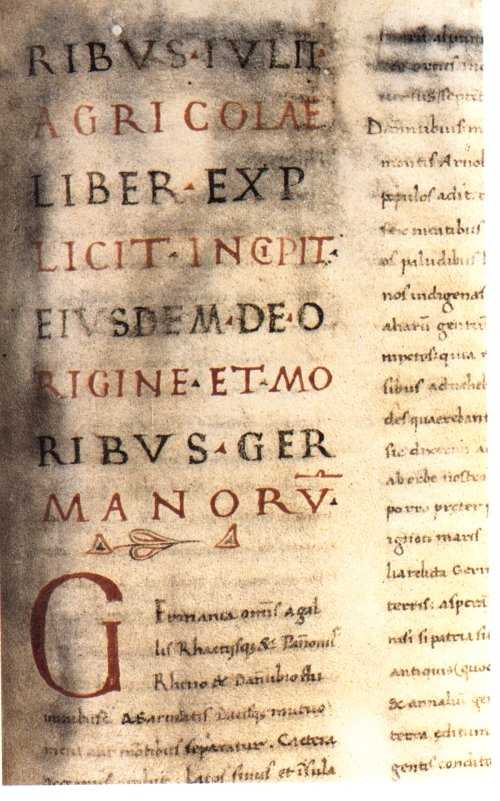I receive weekly reminders of my linguistic ignorance whenever I read anything by authors fluent in Latin. How could I not, whenever Clive James starts to pontificate on the greatness of, say, Tacitus?
“For students acquiring Latin in adult life, the language is most easily approached through those historians who really wrote chronicles — Cornelius Nepos, Sallust, Suetonius and Livy — but with the Histories of Tacitus you get the best reason for approaching it at all… What Sainte-Beuve said of Montaigne — that his prose is like one continuous epigram — is even more true of Tacitus.”
Fantastic! So, which translation should I read?
“There are innumerable translations but the original gives you [Tacitus]’ unrivalled powers of compression.”
As with Latin classics, so with other Indo-European language texts, including Beowulf, originally in Old English, Homer’s Iliad and Odyssey, in Classical Greek, and the ancient Vedic hymns of the Rigveda, in Sanskrit.
For those willing to take up the challenge of reading these canonic texts in their original form, the University of Texas’ Linguistics Research Center provides an excellent resource. In addition to hosting a multitude of Indo-European volumes in their entirety, the LRC has made 10-lesson crash courses, developed by several UT-Austin academics. Lessons include a brief guide to the alphabet, background knowledge on the language’s development, and a grammar guide, all available for the following languages:
- Albanian
- Armenian
- Baltic
- Old English
- Old French
- Gothic
- Greek (Classical)
- Greek (New Testament)
- Hittite
- Old Iranian
- Old Irish
- Latin
- Old Norse
- Old Russian
- Vedic Sanskrit
- Old Slavonic
- Tocharian
Best of all, lessons are based on seminal texts from each language: Latin lessons rely on Tacitus’ Germania, Livy’s History of Rome, and Virgil’s Aeneid, while Homer, Hesiod’s Works and Days, and Plato’s Republic feature prominently in the Classical Greek classes. Students progress through each lesson by reading the original passages, and using the provided guides to translate them to English.
Ilia Blinderman is a Montreal-based culture and science writer. Follow him at @iliablinderman.
Related Content:
What Ancient Greek Music Sounded Like: Hear a Reconstruction That is ‘100% Accurate’
Hear Homer’s Iliad Read in the Original Ancient Greek
Hear The Epic of Gilgamesh Read in the Original Akkadian, the Language of Mesopotamia



For anyone seeking to learn Latin, I highly recommend Evan Millner’s Latinum series at YouTube:
http://www.youtube.com/user/evan1965
Laura, do you know any good video or website for Ancient Greek?
Thanks, that’s great stuff. Does anybody know a good Sanskrit dictionary?
Pasha, it depends on what your needs are.
For user-friendliness for someone coming from one of the other classical European languages, I’d go with Monier-Williams. Macdonnell is also not bad, but it makes you think a little harder (prefixed verbs, for instance, are defined under the unprefixed, root form of the verb).
Scans of both are available here: http://www.sanskrit-lexicon.uni-koeln.de/
Once you’ve gotten the hang of where you’ll need to look up words, though, Apte is really excellent. I don’t know personally of a scanned version online, but this was what I used when I was reading regularly (alas, those days are gone): http://www.aa.tufs.ac.jp/~tjun/sktdic/
Michelle, these texts have the drawback of being sometimes a little thick to get through at first reading, but Textkit (http://www.textkit.com/) has pulled together many public-domain grammars and elementary methods of both Ancient Greek and Latin.
It’s a pity, that old Syriac is not in the list.
I’m very interested in learning old languages.
I am very interested in gaining a level of understanding and proficiency in Old English because much of my current self research is based on the Anglo-Saxon period from the time of Alfred the Great through Athelstan. I would like to know about the course online at it’s associated costs. Thank You.
VERY NICE TO KNOW AND HOPE TO BE A PROUD STUDENT ONEDAY.….
Hi,
I am extremely interested in enrolling in certified online course on Sanskrit. Could you please guide me as to details of Sanskrit course offered through
(i) Open culture
(ii) University of Texas Linguistic Centre
Many thanks for your help and reply in advance.
Gouri Chatterjee
Yale University
Hi and thanks for your great article.
I was looking up the meaning of “infinite” in ancient languages but wasn’t so successful duo to lack of resources and dictionarues.can you tell me the translation of “infinite” in all the ancient languages if possible?
If you’re a reader, please tell me the translation of “infinite” in ancient languages if you know.
Thanks
Persian.…that’s like a river and a very very very epic one i love that persian is one of the impotnant fammily members of old languages
I love latin language
I am interested in Ancient Language and special Latin Corse
I am Interested in Ancient Language and Special Latin
I really love latin
Please, I’d like to improve my English. This course os Free? Anxious waiting tour answer
ROse
I would appreciate a simple translation of this : Nassico abou. .…it is extremely important to me. Please somebody help me with that.
Just wanted to add that openpathshala.com has many courses on Sanskrit — video as well as Skype classes.
Hola me gustaría aprender latín
‘infinite’ means that which has no end or ‘ananta’ (an+anta(means ‘un-ending’) in Sanskrit